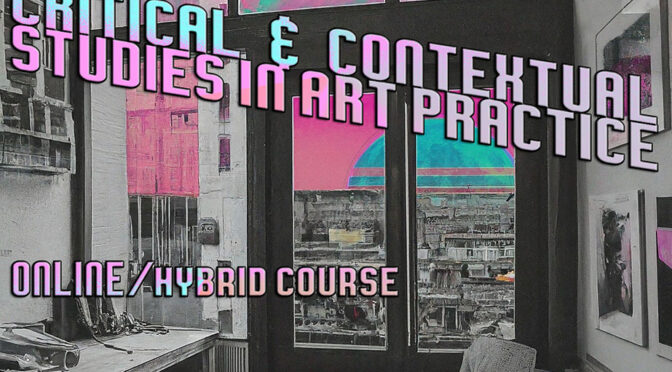Practice🔧Theory⚡Critique
Welcome back! I hope you feel recharged after a fantastic summer 🦜
Feverish preparations are underway for the upcoming Art+Critique course, which begins in a couple of weeks. The cohort is once again shaping up to be a fantastic group of artists and I’m bursting with anticipation
The course is open to everyone at any stage of their career or level of experience but it is particularly suited to those who wish to develop their practice and extend their knowledge.
You may be preparing a new project or portfolio, applying for a residency, a degree course, or funding. Maybe you have reached a pivotal stage, or encountering contradictions and asking questions about your practice. You may have a set of questions and need to develop a critical framework to address them. You might be encountering challenges with your work-in-progress, or you may simply wish to reflect on your practice in a community of peers, or produce new work and receive feedback.
The course benefits socially engaged artists, performance and installation artists, video and sound artists, media and digital artists, sculptors, painters, print-makers, designers, artist educators, curators, writers, researchers and anyone who is pursuing a career in the arts.
Having said that, and while the course has been developed over the last 15 years with art-makers in mind, it is in fact for anyone with a creative or research-based practice, and beyond. In the past, the course has also welcomed curators, writers, researchers, historians, philosophers, designers, architects, musicians, producers, entrepreneurs, and other crafts or professions. This is testament to the universality of artists’ methodologies, and their potential for innovation.
I put the course together when I was completing my PhD at Goldsmiths. The initial omnivorous delight and apprehension of doing a self-taught crash course in the history of the world had given way to the daily grind of research, full-time work, and London-living. I was overwhelmed and I knew there had to be a better way to do artists’ research. I imagined a space where artists could extend their knowledge and develop and contextualise their practice and research on their own terms. From the start, the course aspired to help artists orient themselves and navigate the theoretical terrain without becoming overwhelmed. I had experienced the dampening consequences of prioritising theoretical and critical perspectives over my practice. In the process, I learned two important lessons:
🔧 Theories are tools; useful, but provisional tools. They can help you consider your practice and research from different perspectives. It is very rare to find a single theory that can stand the test of practice for any length of time. Rather, it is a question of using a theory, or combination of theories, for a specific purpose. Better still, you can develop your own theories by reflecting on your practice.🛠️
⚡ A critical mindset is not necessarily a creative mindset. Critique is subversive. It can subvert you and your practice if you don’t separate self-critique from the creative process. You cannot create if you are constantly questioning yourself. You cannot suspend your disbelief and immerse yourself in the affirmative work of the imagination, if you are constantly undermining and negating your impulses. Trying to maintain creative and critical mindsets simultaneously is like crossing a positive electrical current with a negative one. The result is a short-circuit.🔌
In 1965 Sol Lewitt wrote a letter to Eva Hesse, who was struggling with her practice at the time. His advice emphasises doing rather than doubting. You can download the scanned letter, read the text, or an article with some background and scanned images with a text version of the letter.
But where and how to begin? That’s where the course comes in. It familiarises artists with intersecting theoretical fields, and provides entry points by mapping the terrain. Artists are already familiar with these ideas. It’s really just a question of orienting oneself, identifying relevant fields, understing their context and interpreting them for one’s practice. The course begins with the knowledge and experience that participants bring along, and builds on that foundation.
🍒Art + Critique, Autumn 2024🚀
Critical & Contextual Studies in Art Practice Online
15 Oct 2024 – 4 Mar 2025, Tuesdays 18:30-20:30 BST/GMT+1
Pay What You Can £578 / £468 / £358
Develop your practice and extend your knowledge of critical practices, theories and discourses of contemporary art. This online/hybrid course integrates practice and theory and fosters experimentation and collaborative study in a community of peers
📌Artquest One to One📢
Free one-to-one remote advice sessions for London-based artists
24 Oct + 31 Oct 2024, 10:00-13:00 BST/GMT+1
Book a free Artquest one-to-one advice session to get feedback about your work, build a strategy for an upcoming project, get practical career advice, discuss the logistics of operating as an artist and find out about other arts organisations and how they can support you.
